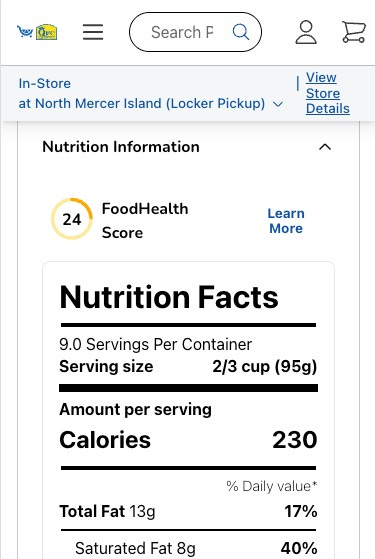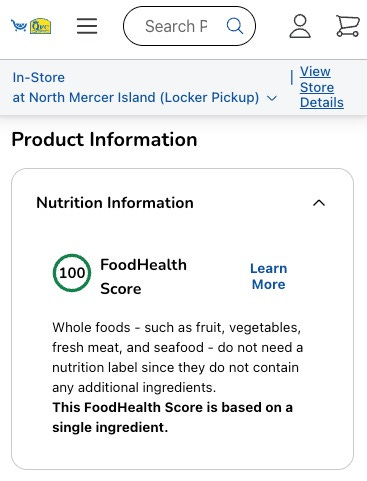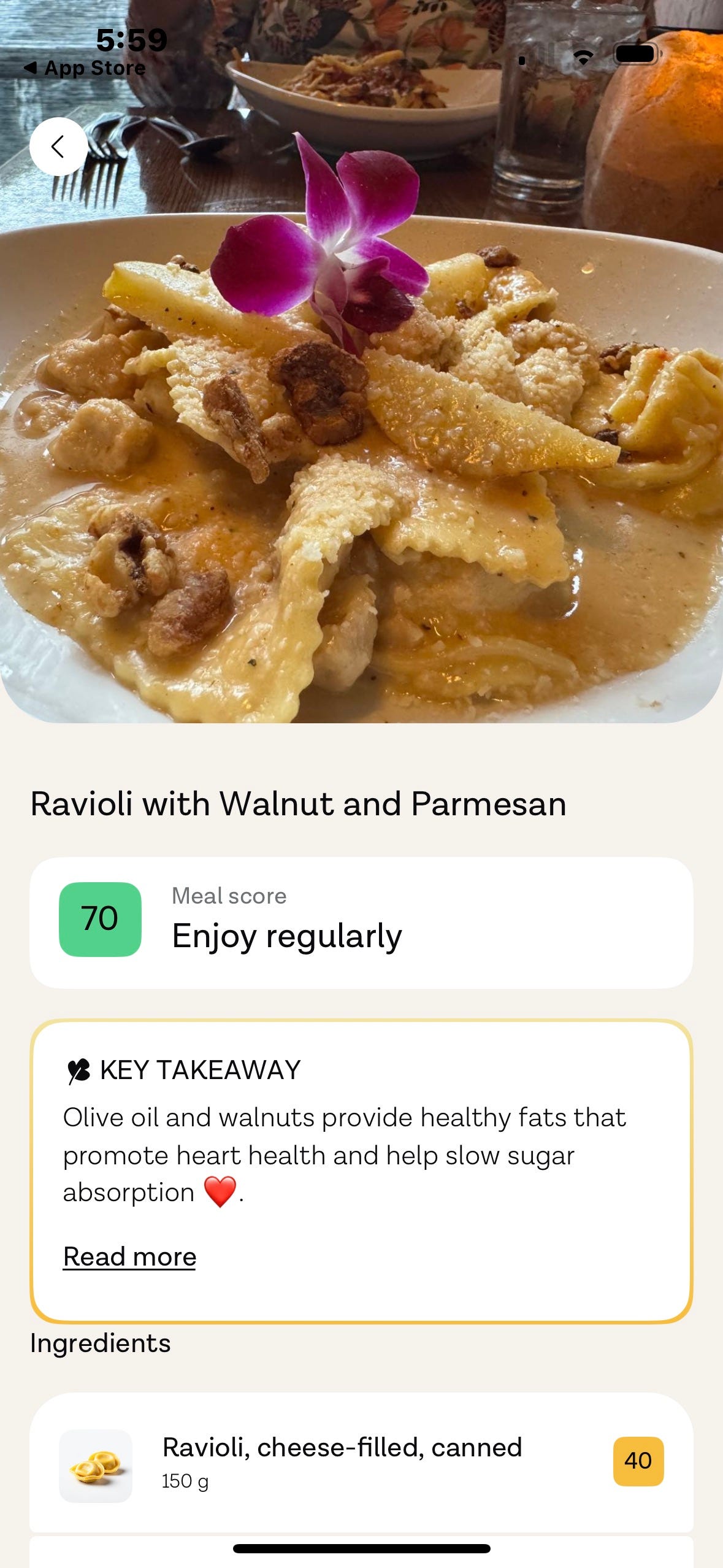Personal Science Week - 250522 Better Labels
New apps for easier nutrition tracking
We’ve written previously about why food labeling makes no sense in the age of ubiquitous smartphones (see PSWeek241212).
This week we’ll highlight two new app-based nutrition analysis tools that make mandatory labels even more obsolete.
Personal scientists like to keep track of what we eat, so it’s a topic we discuss regularly, most recently in PSWeek250508 when we showed how we use an AI chatbot to easily enter and then summarize the day’s food consumption. In that post, I wondered what value you could get from a dedicated tracking app.
This week I’ve been playing with two apps that address that question.
FoodHealth Nutrition Ratings
Foodhealth.co (formerly Bitewell) sells an API to food retailers that calculates a “FoodHealth Score” for every food item. You can’t access the scores directly—you only see them from one of their participating retailer’s own app.
You can see it from within the Kroger app, where for example here’s the score for Tillamook Udderly Chocolate Ice Cream at my local grocery store.
and this one for blackberries
In other words, FoodHealth seems to be a better alternative to nutrition labels for people who want a simple way to learn about the health value what they eat.
Meanwhile, I’ve also been impressed by the AI-powered features in the new Zoe app. I’ve used Zoe several times since they first launched. (See my detailed review from 2020). Compared to other diet recommendation apps, which usually score one food at a time, Zoe looks at foods in combination with the rest of your meal—the way your tummy does. A single food that might be “bad” on its own can be “good” if taken with the right extras. In my case, for example, lamb by itself scores poorly but is great if I have it with beans and an apple.
In previous versions, Zoe still required you to enter your foods one by one in the app, which quickly becomes tedious. The new AI-powered app tries to guess your food based on a photo. In my tests it looks pretty accurate!
Here’s an example from a restaurant meal I had on Mothers Day:
To compare the results, I tediously entered the ingredients into Grok3 and got this:
The results are pretty close! Although some nutritionists might complain about the relatively high fat content, both Zoe and Grok agree on the quality of the fats. Since Zoe tends to optimize for blood sugar spikes, it probably treats that fat as a net positive, to counter-act the carbs of the ravioli. Either way, I’m impressed that Zoe was able to come up with a ballpark answer based purely on a photo.
Does that mean I can stop using a chatbot to track my food? Maybe not yet, since for me part of the appeal of the chatbot is the additional analysis I can get. And I expect that soon the chatbots will be able to do pretty good food breakdowns as well. Still, it’s nice to have a one-shot all-up analysis like Zoe, especially for people who maybe don’t want to go into the details that I do.
Personal Science Weekly Readings
DNA-coded skincare, wearable nanobots: The beauty products of tomorrow: Vogue Business gives a rundown of some products, including a quote from Nathan Price, one of our favorite longevity and personalized medicine scientists. (See my review of his book in PSWeek230615)
Speaking of skin and allergies, here’s a free test kit from Quello. I don’t know anything else, so please let me know if you have feedback.
On sleep, the site ArtofManliness has a set of 45 Tips “that you haven’t heard a million times before” and many of them really are original: eat walnuts (to improve melotonin), release jaw tension (place your thumb under your chin and slowly open your mouth), wear socks (to keep your feet warm), and many more. If you’ve think you’ve already tried everything to improve your sleep, I’ll bet you’ll learn some new tips here.
About Personal Science
Personal science is about making deliberate, evidence-based decisions in everyday life, especially when it comes to health and wellbeing. While professional scientists study populations and look for general trends, personal scientists focus on what works for us as individuals.
Food tracking is a perfect example: we gather data about what we eat and how our bodies respond, then use that information to make better choices. But the right approach depends on your goals and preferences. Some people prefer the detailed analysis that comes from manually tracking ingredients in a chatbot, while others benefit from visual AI tools like Zoe that can quickly assess a meal from a photo.
What matters most is finding a system that helps you discover useful patterns without becoming so burdensome that you abandon it. The best tracking method is the one you'll actually use consistently.
If you have other aspects of personal science you'd like to explore, or if you've found tracking systems that work particularly well for you, let us know.





This is off topic, but I’m looking to do more at-home blood analysis and wondering if you’ve seen anyone selling DTC alternatives to those nasty finger prick lancets? Tasso has a cool product that looks promising, but as per usual it’s stuck in FDA permitting purgatory….
I'd be impressed if Zoe asked follow-up questions when needed, like "are those tortellini cheese-filled"?